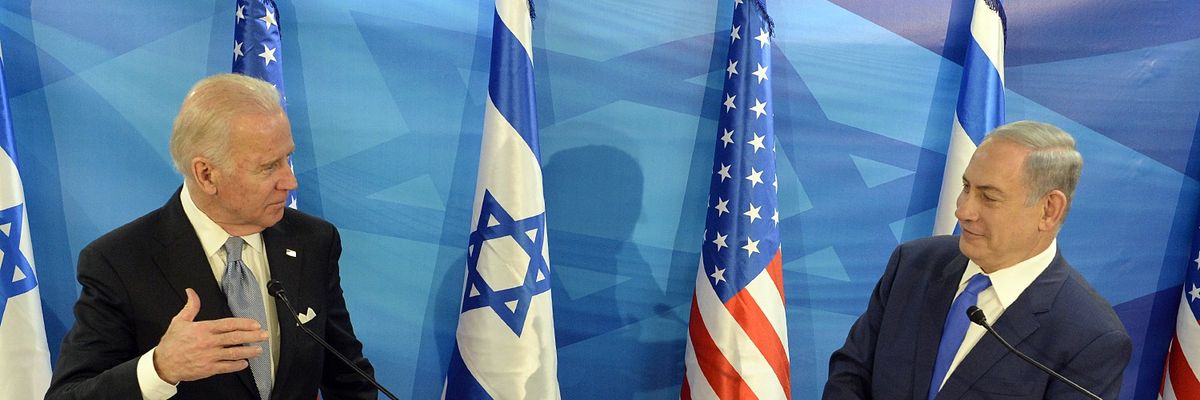The Biden administration recently announced a new arms transfer policy, directing the State Department to bar weapons sales to states that are “more likely than not” to commit human rights violations with American arms. According to the official policy, the purpose of this heightened standard is to “[p]revent arms transfers that risk facilitating or otherwise contributing to violations of human rights or international humanitarian law.”
American arms exports account for nearly 40 percent of the global arms trade, and human rights restrictions on these transfers, if observed, could ensure that American weapons are not used to violate international law.
However, the Biden administration’s new policy omits a crucial — and often overlooked — component of the U.S. role in the global arms trade: extensive American subsidization of Israel’s domestic arms industry.
There are two ways in which a foreign state can procure American weapons: direct commercial sales and Foreign Military Financing. Through direct commercial sales, foreign states may negotiate weapons contracts directly from American arms companies, and these contracts must then be approved by the State Department. On the other hand, through Foreign Military Financing, the United States issues monetary grants “to foreign militaries for the purchase of U.S. defense equipment, training, and services.” Simply put, while direct commercial sales are paid for through the defense budget of a foreign country, Foreign Military Financing allocates American funds to foreign governments for the purpose of purchasing American weapons.
Foreign Military Financing is the current framework for government-to-government weapons transfers established by the Arms Export Control Act of 1976. However, there is one exception to the Foreign Military Financing program’s provisions: Israel’s arms industry. Foreign Military Financing must be used “exclusively to procure U.S. military equipment and training” for all states except Israel, which may use a portion of the funds for “research, development and procurement of advanced weapons systems.”
In the 1980s, American military aid to Israel began incorporating an “offshore procurement” clause, meaning that unlike all other Foreign Military Financing, the funds to Israel were not earmarked solely for purchasing American weapons, but could be used for domestic development and production as well. Israel receives $3.3 billion in Foreign Military Financing from the United States every year, which is more than every other state in the world receives combined (around $150 billion since 1948). American Foreign Military Financing finances upwards of 16 percent of Israel’s total annual defense budget. About 75 percent of this aid is earmarked for the purchase of American weapons, while 25 percent of the funds are used for the research and development of indigenous Israeli weapons.
According to the Carnegie Endowment for International Peace, American foreign military financing amounts “to an $815 million annual subsidization by U.S. taxpayers of Israeli weapons manufacturers.” This annual subsidization of Israel’s domestic arms industry (while still only 25 percent of the Foreign Military Financing granted to Israel) accounts for over 13 percent of total American Foreign Military Financing expenditures.
Through this mechanism, the United States has provided tens of billions of dollars in weapons development subsidies over the last 40 years, helping Israel establish a massive arms industry.
Today, Israel is one of the world’s largest arms exporters. Unlike American arms export policy, Israel’s arms transfers lack any transparency mechanisms and are conducted in near-total secrecy. In 2021, after reports revealed that Israeli defense technology was being used by repressive states to persecute dissidents, human rights activists sued Israel’s Defense Export Control Agency, demanding greater transparency in defense-related exports. Israel’s Supreme Court not only dismissed the case, but also barred future lawsuits of that nature, stating that in “issues relating to national defense and security, the prerogative is the state’s and the law provides it with very wide discretion.”
Despite this lack of transparency, journalists and human rights organizations have been able to obtain a significant amount of information regarding Israel’s arms exports through the import records of foreign states, leaks to the media, and Freedom of Information Act requests. This information demonstrates that Israel routinely transfers weapons to states engaged in gross human rights violations, including genocide.
Over the last four decades of heavy American subsidization of Israel’s arms industry, Israel has transferred weapons to over 100 countries, including South Africa under apartheid, Serbia during the ethnic cleansing of Bosnians, and the repressive military juntas in Guatemala and El Salvador (as well as human rights-abusing non-state actors like the Contras in Nicaragua). Within the last decade, Israel continued to supply arms to Myanmar even as the military junta committed genocide against the Rohingya, and exported weapons to South Sudan “despite a near-universal arms embargo over the bloody civil war there.” Israel is currently transferring arms to human rights abusing governments such as the Philippines, Morocco, Bahrain, the United Arab Emirates, and Azerbaijan. According to a recent Haaretz report, the Israeli government has “approved every single arms deal brought to them since 2007.”
So, the United States subsidizes Israel’s domestic arms industry with around $815 million annually, and Israel subsequently exports those subsidized arms — without any transparency — to governments committing grave human rights abuses, including genocide.
The Biden administration’s new arms export policy is a significant win for human rights advocates. However, the United States’ significant financial contribution to Israel’s arms industry should not be excluded from this policy. This extensive subsidization means that Israel’s domestically-produced arms are, in a very real sense, American arms as well.
If the United States wants to continue subsidizing Israel’s arms industry, Israeli weapons exports should be subjected to the same transparency and human rights restrictions as American arms exports. If the Biden administration is serious about preventing human rights violations with American weapons, it must not ignore the American-subsidized Israeli arms exported to known human rights abusers.














